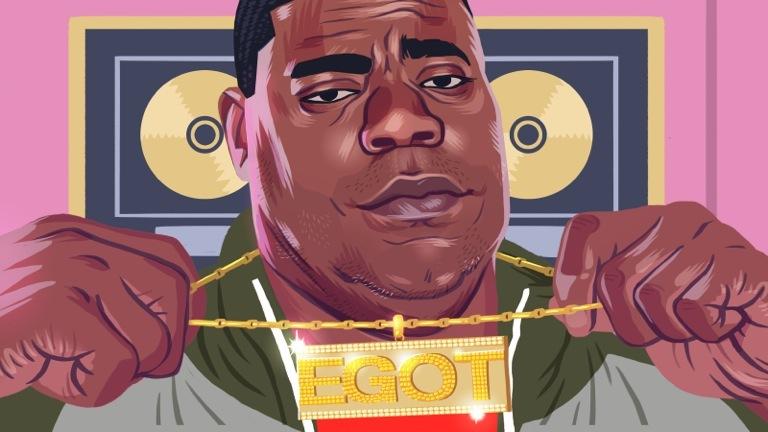“Who’s an EGOT?” How ‘30 Rock’ Made a Fake Award Into a Real-Life Goal
The EGOT—that’s an Emmy, a Grammy, an Oscar, and a Tony, for the uninitiated—was conceptualized by actor Philip Michael Thomas in 1984. But it was a ‘30 Rock’ story line, featuring a Tracy Morgan one-man play, a fake necklace, and a Whoopi Goldberg cameo, that made the EGOT a cultural touchstone. Here’s how that all came together.For years, awards-show enthusiasts have come up with elaborate systems for predicting and logging the entertainment world’s winners, losers, and tragic snubs. As hype over who wins has grown, so has a fascination with show business’s overachievers. Only a talented few have reached the apex of this proverbial horse race, but it wasn’t until a multiseason 30 Rock subplot that the public knew what to call it. In “Dealbreakers Talk Show #0001,” the seventh episode of the show’s fourth season, Tracy Jordan (Tracy Morgan) strolls into a jewelry store called Yakov’s Nubian Bling Explosion to find a gift for his wife as part of a larger effort to prove he’s responsible enough for them to have a daughter. But within seconds, his eye catches on a large gold necklace with diamond-encrusted letters that spell out “EGOT.”
“Who’s an EGOT?” Jordan asks in earnest. “EGOT is not a person, T.J., it’s a goal,” the clerk replies with the wise intonation of a Disney character explaining an ancient spell. “It stands for Emmy, Grammy, Oscar, and Tony.” He explains that the necklace once belonged to Philip Michael Thomas, the Miami Vice actor who—and this part is true—coined the term in a 1984 interview with the Associated Press to describe his professional ambition of winning all four awards within the next five years (though Thomas later tried to backtrack and say he intended the acronym to stand for “Energy, Growth, Opportunity, and Talent,” the die had been cast). “That’s a good goal for a talented crazy person,” Jordan concludes, right before he purchases the necklace and sets out on a multiseason journey to do the same.
Nielsen Media Research estimates that “Dealbreakers Talk Show #0001” was watched by 6.3 million households when it originally aired in December 2009. “When that episode came out, there was a lot of talk about the EGOT, about EGOTing, and that felt like a new, fresh idea,” Kay Cannon, a writer and producer on 30 Rock, told The Ringer. The episode generated enough buzz that the team decided to submit it to the Emmys for consideration. “So many people were talking about it. We thought that people would really remember this idea of EGOTing.” Though “Dealbreakers Talk Show #0001” didn’t win any awards, the story line incepted the public and news media with the idea of EGOTing itself. A 2016 feature in The Atlantic chronicled the steady rise of the term in Google searches and news outlets following the fourth season, concluding that “EGOT didn’t really exist before 2009.” Since then, variations of the accomplishment have spawned, ranging from EGGOT (Emmy, Grammy, Golden Globe, Oscar, Tony) to MacPEGOT (MacArthur Fellowship, Pulitzer, Emmy, Grammy, Oscar, Tony). Below is the story of how the term EGOT was plucked from pop culture obscurity, presented to the masses via one of America’s most-loved sitcoms, and held up as Hollywood’s holy grail.
Part 1: Tracy Learns What an EGOT Is
Kay Cannon (30 Rock writer and producer): In the 30 Rock writers’ room, we had a group of people who really had their finger on the pulse of what was going on in pop culture and just things that have happened in the past. We had a couple writers who had been writing for the last 10, 20 years. Certainly Tina [Fey, creator and star] and [writer and executive producer] Robert Carlock and people who came from SNL. They just know so much from all the years of being around hosts.
I had a pretty solid grasp on who had EGOTed. For some reason that was something I paid attention to even before I was a writer, because I remember thinking Whoopi Goldberg had done that and how impressed I was by her doing that, because she did it “the harder way.” It wasn’t from the same project or it wasn’t writing music or something like that. She played four different roles and she won those awards. I always felt like: “Why aren’t more people talking about this?”
Tom Ceraulo (30 Rock writer): It was June 18, 2009, the second day back for work on the fourth season. Generally, what would happen is on the first day, there would be big-picture discussions and getting reacquainted with everyone and meeting new people. The second day, we basically would go character by character and discuss what we might want to do with that particular character over the course of that season or the first half of that season. On that day, we did Liz (Fey), we did Jack (Alec Baldwin), and then we did Tracy.
Cannon: We were talking about how the guy from Miami Vice, [Thomas], had bought a necklace saying “EGOT.” An EGOT necklace, because that was his goal. I don’t even know if he won any awards. [Editor’s note: He did not.] … Then somebody in the room just said like: “Oh, wouldn’t it be funny if Tracy tried to EGOT?”
Ceraulo: We went down a Google rabbit hole, starting with Philip Michael Thomas and the EGOT necklace. I can’t say that I had ever heard of it before that day. Then we read about everybody who had achieved it. By the end of that day, we had done as much research as you could do on the internet. One pitch on the initial day posited that getting all four parts of an EGOT all in the same year would be called a “Grand EGOT.”
Don Scardino (30 Rock producer and director): I didn’t know what an EGOT was. I’ve been in the business my entire life. It never occurred to me, or I never read about it. At first, because of the way 30 Rock writers’ imaginations are so insane, I thought they had made it up. I thought, “This is a joke, right?” It must have been Robert. He said, “No, no, no. This is a real thing. This is an actual thing.”
Tracy Morgan (Tracy Jordan): I didn’t even know what an EGOT was before the episode. I remember reading it at the table read. I found it very, very funny.
Cannon: In the first three seasons, we didn’t really do as many arcs for characters. It was just always so funny and not necessarily episodic, but we weren’t really telling anything serialized. And then you get to Season 4, and this EGOTs arc was really important for Tracy. It was the first time we were ever doing something like that with him, where we were giving him a real want and a real goal, and we were doing it in whatever ridiculous way that Tracy would do that.
Morgan: It was awesome. I was so happy when I first read the script. I was thankful.
Emily Nussbaum (TV critic for The New Yorker): Mostly, I felt like this arc veered toward several main themes of 30 Rock and made them more intense. One of them is actors are insane, dumb comedy is as important as pretentious drama that wins a bunch of awards, and that comedy, in general, is as important and valuable as drama. And that it is exhausting to be famous and messes with your head, so it’s actually not that surprising that actors are crazy.
Part 2: Tracy Gets His EGOT Necklace
Cannon: Tracy already wore a lot of necklaces and chains and stuff like that in general, so it just seemed natural for him to put on the EGOT necklace.
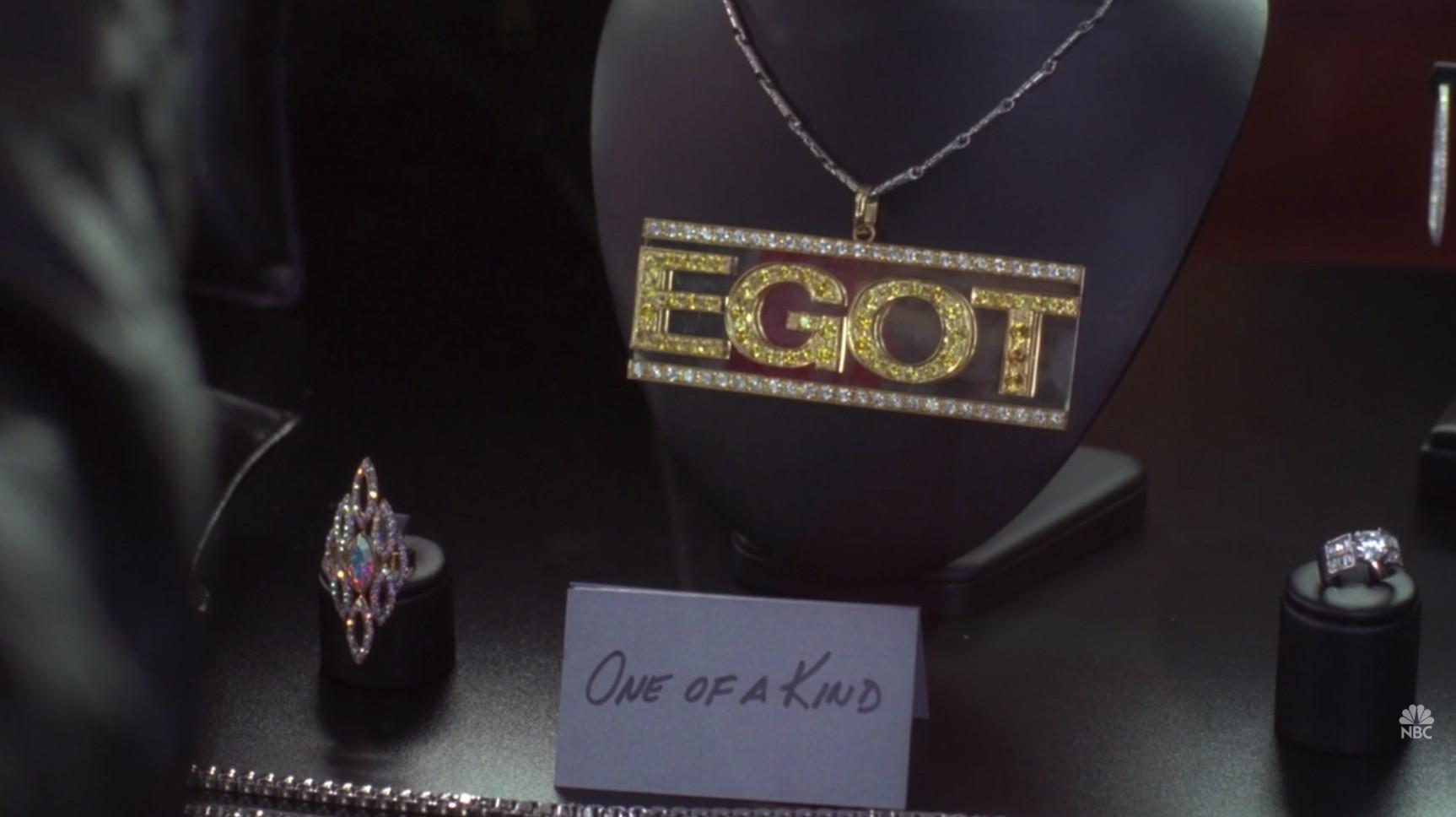
Kevin Ladson (30 Rock property master): They said they wanted Tracy to be wearing the EGOT [necklace]. I said, “What’s an EGOT?” The answer that came back was: “The EGOT was an actual necklace made by Philip Michael Thomas, the actor who played Tubbs on Miami Vice. Attached is the best pic on the internet, showing him with it. It looks like a Saint Christopher medal, way too tasteful, but here it is.”
Scardino: I said, “Make it as blingy as possible,” but so that we could read it. There [was] a lot of discussion between the producer and the writers, Kevin [Ladson, the prop master], myself, about size. How big? Well, obviously it’s got to fit on his chest, but we don’t want it so small that you can’t read it. We want it big enough to almost be absurd, because it would play a lot during that show. So that was step one.
Ladson: The best part about that job was that Tina basically set me up in a Geppetto’s workshop. I called it “The Crow’s Nest,” which was an office above the stage where we shot. So, I could look down and see what we were shooting. … Typically I had literally four, maybe five days to prep an episode, which is a lot for television. I had a jewelry station up in my office. I was blingin’ stuff every week.
So, I was able to sketch and present and get rejections and comments and additions. I designed it, gave them a couple of designs of the EGOT. One was a slight rip-off of the Star Wars letters. Tina gave me notes to make it larger, with a different border. I think there were at least three that were made, because Tina rejected a couple of them. … I have a jewelry person. His name is Hip Hop Harry. I called Hip Hop Harry.
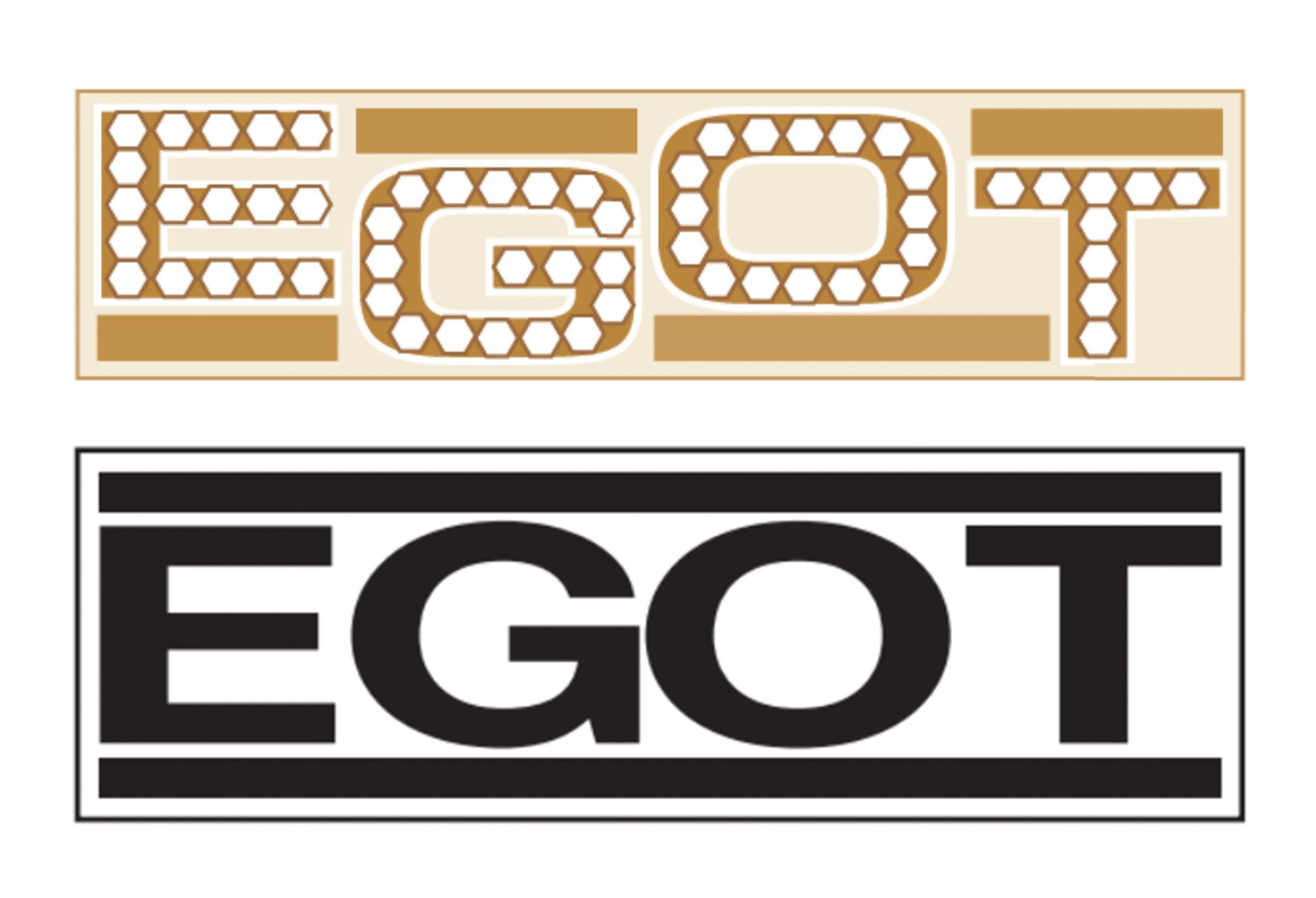
Cannon: I remember seeing different photos of how big should the necklace be.
Ladson: When I saw one of the prototypes, it didn’t look gold enough. I said, “Can we plate it with a little bit of gold?” And so, the second one that came back, that one, after it had a gold plate on it, then it really looked good. It was based on the EPMD logo. It cost $3,200. That was pretty easy. We had so many other harder things to do, like I had to create Jesus in a soup, one time. That’s hard.
Scardino: We had to find a jewelry store that was near the Rockefeller Center area. We found this place. I believe it was on 57th Street. The owners of the jewelry store were delighted to have 30 Rock there. I was looking for something where we could position it in a jewelry case, where I could also get behind it and shoot it, because I wanted to shoot low angles. Tracy comes in to get something for Angie, his wife, and gets totally distracted the minute he sees the EGOT. So I said I wanted to get low, so I could really get the EGOT’s point of view.
Morgan, on when they presented the necklace to him: I was laughing. I was crying. I mean, come on. I looked at Kay and I said, “This is crazy.” They made it very convenient for me. They knew we were gonna be working with it, so they made it very comfortable. I believe I still have it in storage.
Part 3: Tracy Meets Whoopi
After purchasing the necklace, Tracy seeks advice from Whoopi Goldberg, a real-life EGOTer, about how to EGOT. On his way out, he attempts to steal her Oscar.
Ladson: When we did the Whoopi Goldberg portion of that episode, we had to get an actual Oscar. The prop houses, they have some awards that look close to the original awards, you know? And the Emmy looked good enough. We just spray-painted it, because it was just a metal statue that had a decent face. Same thing with the Tony. Only thing I didn’t have was the Oscar. I didn’t know anybody with an Oscar and I said, “Well, can I ask Ms. Goldberg if we could use her Oscar to dress the set?” For some reason, the producers wouldn’t let me ask Whoopi Goldberg if we could borrow her Oscar.
Scardino: We just felt we ought to get [our own Oscar]. If for any reason anything happened to it—it got lost, it got dented, something knocked it off the table—then it would be our responsibility. You always want to make sure that you have the right to fuck up anything that you get.
Ladson: The producer knew a woman who won an Oscar for a documentary, Deborah Schaffer. And so, I went to this woman’s house. She let us use the Oscar, but she had dropped the Oscar like three years prior, and the neck on the Oscar was looking to the side. It was bent.
I said, “Can I repair this for you, or try to repair it?” She says, “No, no, no. The Academy Awards have a service where they will repair it, so don’t touch it.” If you look closely at the episode, the Oscar’s neck is leaning to the side. And for every shot they did, I tried to just tweak it so it didn’t look like the head was on the shoulder.
Cannon: I was so excited that Whoopi was on the show and that we got her playing herself, as someone who’s EGOTed. That was a little bit of a dream come true. When we filmed in Whoopi’s apartment, that scene with all of [the] awards, we were at Columbus Circle or somewhere around Central Park and we were up above and we were looking out at all the beautiful trees in New York. I was just listening to Tracy and Whoopi talk to each other and with such fondness. Whoopi was talking about how she was so happy to do this, because a lot of people don’t know. They were just talking about the work. They were talking about the hustle. They were talking about how hard it is. That you just want to work and want to get that paycheck.
Scardino: Whoopi, at first she said to me, “How much liberty can I take with this?” And I said, “Well, we’re a written show. We are very proud of our writing, but if you have any stuff you want to ad-lib, toss in, improvise, they’re totally open to it.” There was a line for when she stopped [Tracy] from stealing the Oscar and says, “colored man.” I think it was just written as, “What are you doing, fool?” Something like that, and then her first improv was, “Negro,” which made him drop the Oscar, because he was totally shocked. Everybody cracked up and ruined the take. She said, “What, I can’t say that?” And I said, “No, no. Let’s do another one like that, because we should have that for sure. Let’s not crack up,” and then she said, “OK, I’ll give you some alternates,” and one of the alternates was, “colored man.” She said, “Because that’s what I would say if I saw him stealing my Oscar. That’s how I would call him out.”
Morgan: Whoopi’s like an aunt to me. I would just ask her, “How does it feel?” And she’d say, “You know, it’s an award, but those things don’t last. What lasts is the work.” She’s always maintained to me to be funny first and work hard, work smart. She’s always talking to me about my work. The awards and all of these things are great to have, but it’s about the work.
Part 4: Tracy Gets a Grammy
Tracy attempts to record a song that combines five of the most popular musical styles. There’s a Mariachi band, a small symphony, a DJ, and a guy with an electric guitar. Kenneth (Jack McBrayer) plays the cowbell. Jenna (Jane Krakowski) does scat. Though he’s never seen winning an award for the song, he apparently does.
Ceraulo: If you look at the Grammy nominations every year, it seems like there’s three or four times as many Grammys given out as Oscars. It seemed like, well, anybody could win a Grammy. I don’t know, nominate Jimmy Carter for reading his book. The first thought is it would be funny to have Tracy try to write a song. He would try to make it the best song ever, and he would do that in the worst possible way.
Cannon: Tina Fey’s husband, Jeff Richmond—who was executive producer on the show and a musical composer on the show—started talking about how a lot of the EGOTs compose music, and that seemed to be like the easiest way to do that.
Scardino: Jeff Richmond, our composer, is in the scene, the little short fellow behind the piano keyboard. He actually scored it to be those [songs] together. It’s that wonderful, imaginative writing style that our 30 Rock writers possess, particularly Tina and Robert, of doing that kind of a mashup. In dialogue it was [Tracy singing], “People / love song / about love / and cars.” And the line is, “I’ve started already.” It’s typical of Tina and Robert to say, “No, put that in the song as well.”
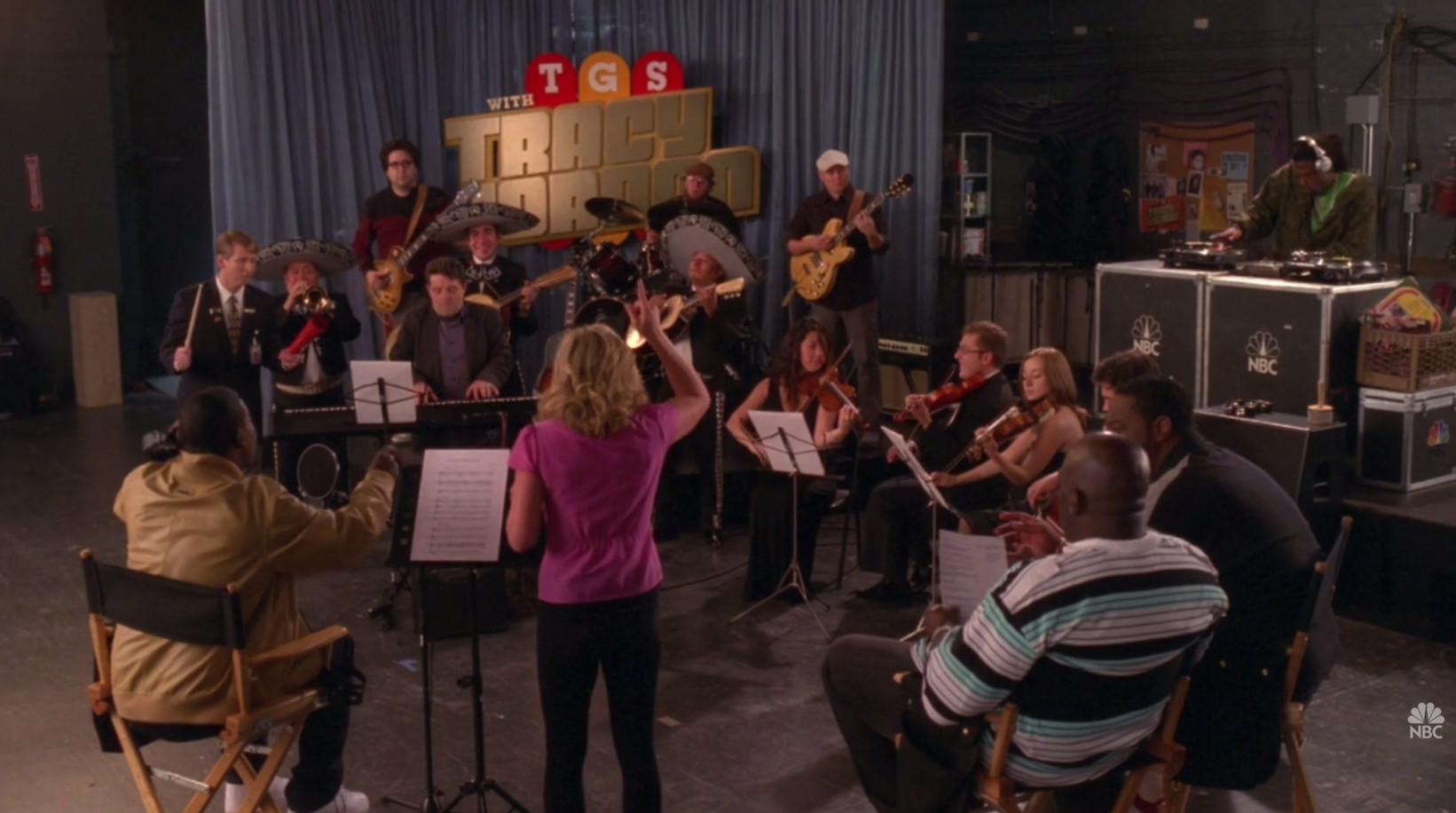
Morgan: It was crazy. You have all those people. So much action happening. By myself in that scene, I can’t make that scene great. It was a masterpiece because every other person that was in the scene made it a masterpiece.
Later Tracy serenades his wife, and she agrees to have a baby girl with him.
Scardino: He had this bit where he’s supposed to sing “baby girl, baby girl, you’re the product of doing it,” or whatever that was.
Morgan: I can sing. My dad was a singer. My dad was a musician, so he taught all his kids how to sing. My sister sounds like Patti LaBelle. So when I did go off-key I was thinking, “What would be the funniest way to do it?” I’m old-school funny. I’d do anything for a laugh.
Scardino: Actually, I tried to get him to sing it sort of in tune. I said, “You should sound like a lead singer, like Smokey Robinson. So that you have this high falsetto thing at the end,” and he says, “Oh yeah, I got you, Don. I got you. I got you.” And then he did that.
Part 5: Tracy Gets a Tony
Tracy stages an improvised one-man Broadway show and receives rave reviews. He later learns he must perform it at least eight times to qualify for the award. Jenna attempts to coach him, but he finally gives up and reads names out of a phone book.
Cannon: I had to look up all the rules and what you have to do to win a Tony and what category. I think you have to do like 68 performances or something like that.
Ceraulo: The one-man show came from looking at it as, “OK, it’s Tracy Jordan, and he’s gonna try to win a Tony award. Again, he’s not gonna do it correctly. He’s gonna do it in a Tracy Jordan way, so what would he do?”
Cannon: We were looking at other people like, what were their tactics? And so the one-man show felt like the right thing to do to win a Tony, because he could do it last-minute. He actually didn’t have a show. Kind of in name alone, he should win a Tony.
Scardino: I used to say to Tina, “You’re listening through the keyholes, aren’t you?” Because Tracy was about to do a big [show] somewhere. I can’t remember whether it was at Carnegie Hall, or what he was going to do. A solo concert, or maybe it was his HBO thing. We said to him, “So are you rehearsing?” And he said, “No, I’m just going to wing it, go out and talk about whatever I’m thinking.” And we were like, “Oh, Tray, do you really think you should?” There are no guard rails with Tray. He’s wonderful. There’s an innocence to Tracy, despite this hard life upbringing. He’ll say whatever pops into his head, so that’s where that whole line came from about a new Broadway show without a script or whatever—“I gotta do it the same way every night?”
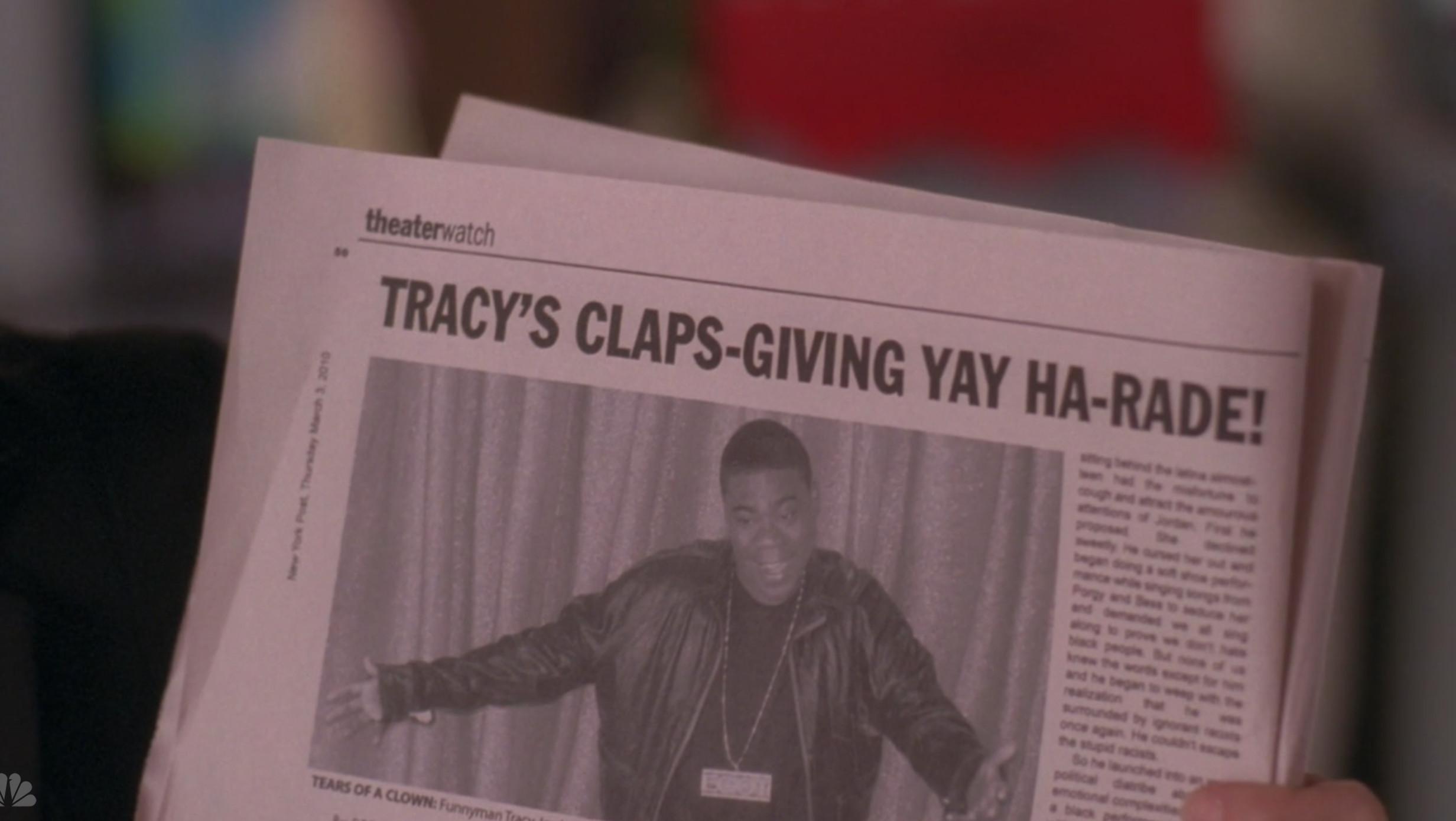
Scardino: They asked me in production meetings, was I going to see [the newspaper] on camera? And I said, “Yes, briefly,” but I would see it sort of full-frame when Kenneth holds it up. They said, “OK, so we better write something.” As a rule we did that when anything appears, a magazine, even if it’s going to be seen briefly. Because folks at home can freeze-frame.
Cannon: I think I probably wrote the review. Whenever there was something that was on paper or something like that, where the TV was gonna grab it for a second, and they were like, “Oh, we just want to make sure,” because our fans were such good fans and they really loved that we paid attention to detail.
Morgan: The phone book thing came from Chris Rock saying one time that Tracy Morgan could make the phone book sound funny. So we put that in there.
Scardino: What’s funny about that [scene] is when he’s reading the phone book and the fade comes, over [30 Rock executive producer] Lorne [Michael]’s credit, you hear the last name in the phone book. It’s Lorne Lipowitz. That’s Lorne Michaels’s real name.
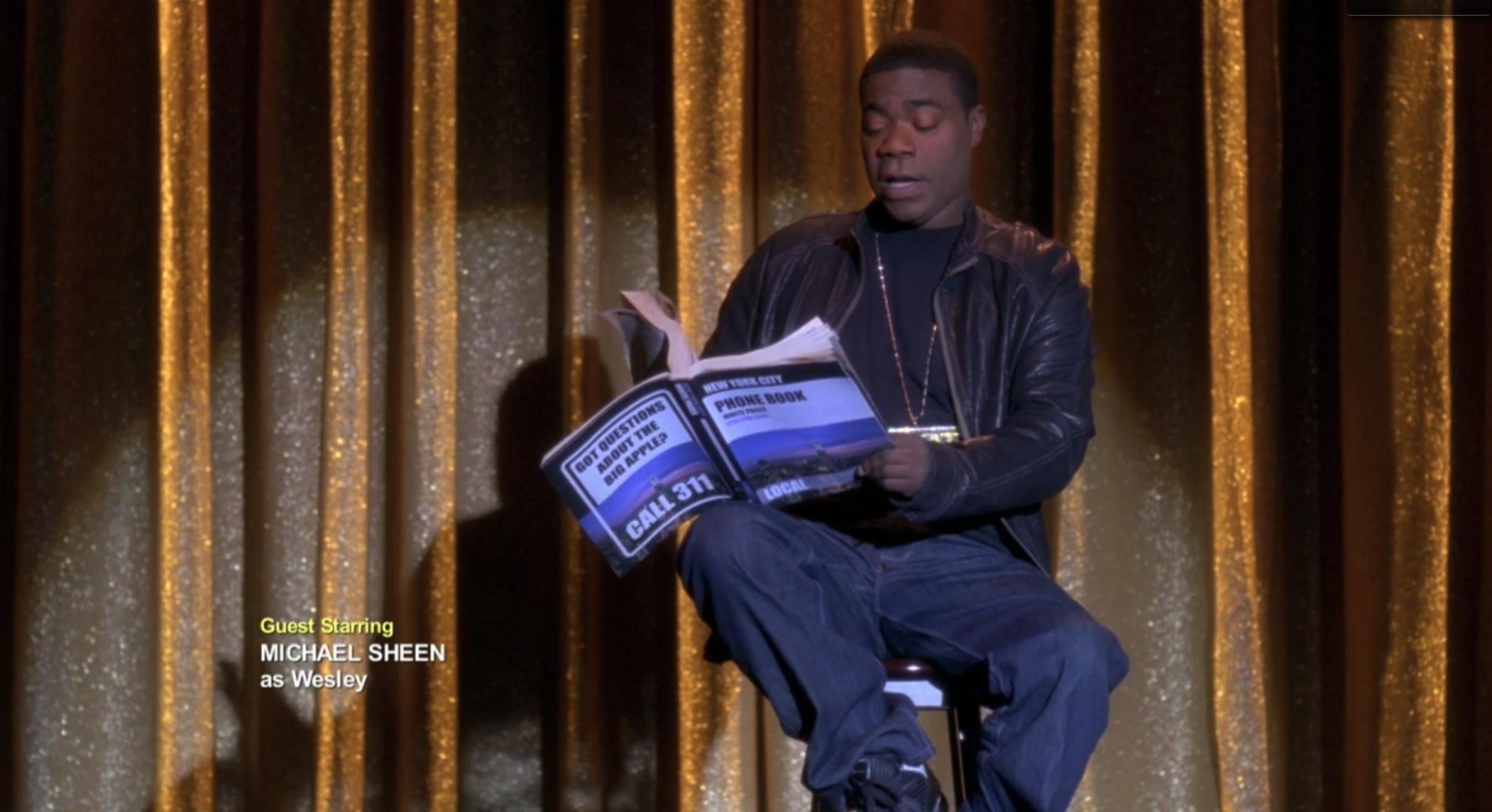
Part 6: Tracy Gets an Oscar
Tracy forgoes a role in Garfield 3: Feline Groovy to star in a drama based on his impoverished upbringing called Hard to Watch. Kenneth brings him to the back stairway of a copy center, where his neighborhood once was, and the memories come flooding back.
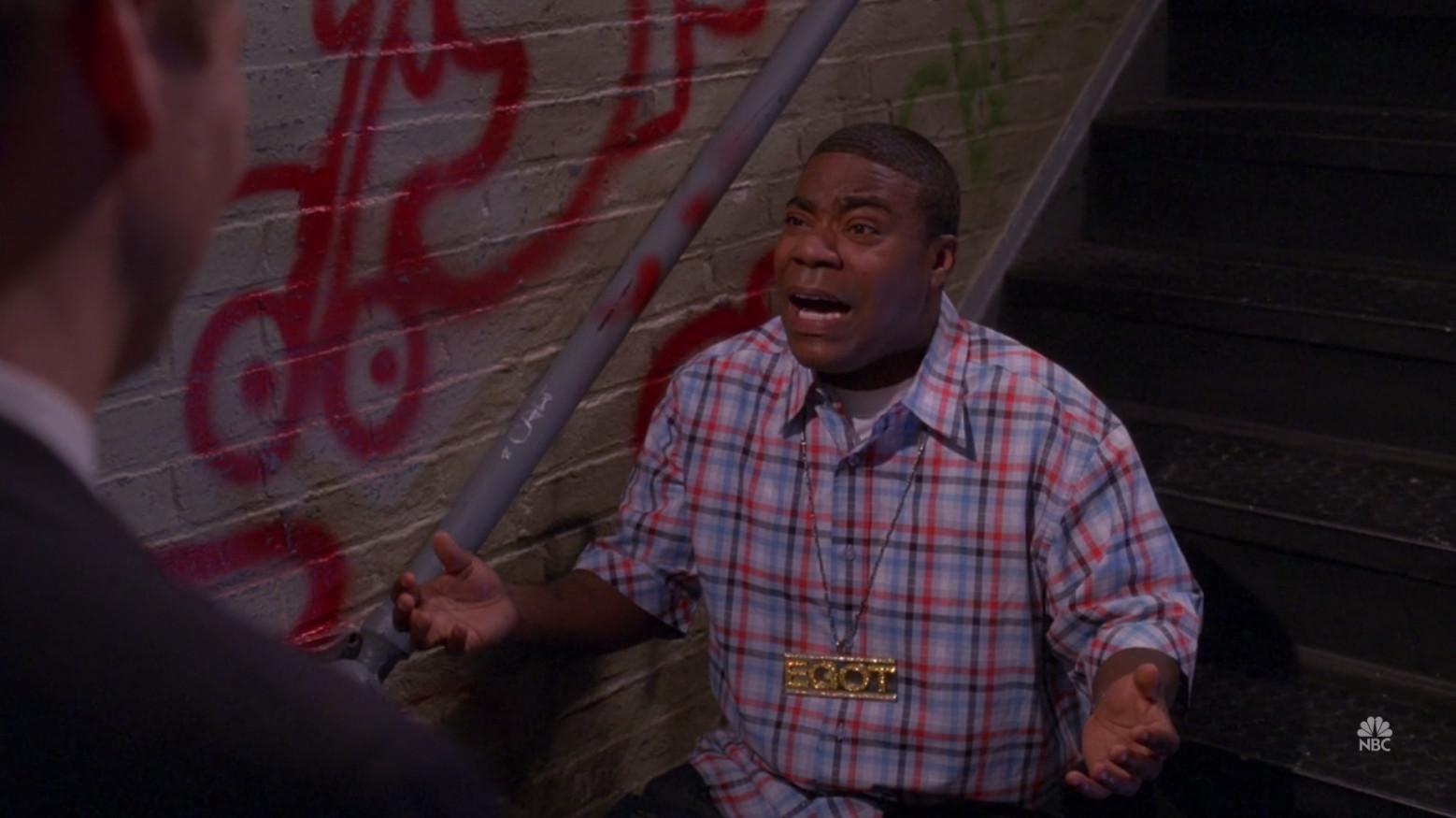
Cannon: That was the year that Precious came out, and you get screeners to watch for awards. I brought Precious home over the holidays, and my dad and my whole family, I have a bunch of brothers and sisters, and we watched that movie and my dad was like, “Is this entertainment? This was so hard to watch!” He was really just so upset by how difficult it was. That was definitely in the air at the time.
Ceraulo: A lot of times, when you have a comic actor like Mo’Nique, who does a movie like that, it is seen by some as a bid to win an Oscar. It sort of made sense for Tracy to try to go that route. There was some talk that he wouldn’t win the Oscar because, no matter what he did, it would be construed as comedy. But then that went out the window, and then we actually had him win the award. I don’t remember it being any more than that, like, “Well, Tracy’s gonna try to win an Oscar. How do people try to win Oscars? Oh, Mo’Nique just did this, and so let’s do it.”
Scardino: It turned out that our genius handheld camera operator, Peter Agliata, was the main camera operator on Precious, which is all shot very handheld. So when we discussed whatever clips we might see from Hard to Watch, we said that Peter should shoot them like he shot Precious.
Nussbaum: I think it’s Grizz [Grizz Chapman] who straightforwardly says to him, “Tray, use this pain to get your Oscar.” The thing is, Tracy came from obviously an incredibly painful background, but the interesting thing to me about the show is that almost every character, other than Liz, came from somewhere outside New York and from some really messed-up situation. Like, Kenneth came from a messed up situation, Jenna did, and so did Jack. They’re all from very different ethnicities, different economic circumstances, but they’re all people who transform themselves into fancy people. The show itself is really penetrating about the sort of way that do-gooder, liberal stuff ends up being a sort of phony, masochistic theater for show business.
Ceraulo: [For the stairwell scene] there were a few script pages with a lot of things that were shot, and I don’t think all of them aired.
Nussbaum: I’ve watched those scenes a million times, where he’s sitting on the stairwell and just listing things and being like, “I saw a baby give another baby a tattoo. They were very drunk.” They’re so good, those speeches, it just blows me away. It was one of those things that I thought 30 Rock always did best, when you think about the themes of 30 Rock rather than the jokes and the characters. It’s just the show itself having this constant internal debate about itself.
Morgan: That was my opportunity to get dramatic, and when you have somebody who’s affiliated with funny, the more dramatic, the more people are gonna find it funny. I do remember them giving me some space to ad-lib with it a little bit.
Part 7: Tracy Flees His Fame
Tracy finally EGOTs. (His Emmy win was never shown; Ceraulo remembers a rejected pitch in which Tracy Jordan just completely missed the ceremony that got him his Emmy.) With his new title, a world of opportunities both extravagant and deeply boring open up for him. He eventually fakes a trip to Africa to dodge his new responsibilities.
Ceraulo: Especially when you win an Oscar for a movie that is socially conscious, I think the idea was that you get a level of importance attached to you that maybe wouldn’t necessarily work well for Tracy Jordan.
Nussbaum: I feel like this is actually a very sympathetic plot about Tracy acting increasingly pretentious and overwhelmed, because who could blame him? He has to go to these horrible award ceremonies, do these do-gooder stuff. … The whole point is that winning the EGOT ends up being very instructive for [Tracy] because he feels pressure to be a role model. He has to do all these stepping to the next level things and he has to try to escape it. He wants to say offensive things because he just doesn’t want the pressure of having to be people’s role model. I’m very sympathetic with that.
Morgan: I had a kidney transplant. After the kidney transplant, I was off the show for six weeks. Being in Africa, that was a great, great thing for them to write for me—so that’s what happened with that. I was able to heal and come back to the show.
Ceraulo: We may have tried to lessen his workload. There was one pitch, that I don’t think was ever considered, that he was gonna go back to parking cars at the parking garage, and then when he went there, Daniel Day-Lewis was gonna be parking cars in preparation for a role, and basically Tracy couldn’t get away from it even if he wanted to. There was one that involved a wax museum. Tracy has a heart-to-heart with either his lizard or a wax figure of himself at Madame Tussauds. At the end of the day it came down to: Tracy doesn’t want to have to do all this. Having breakfast with Chuck Schumer—the last character in the world you would expect to enjoy something like that is Tracy Jordan. With a lot of these, it just ends up [being] what made the room laugh the most. Him not liking the responsibility of being a prestige actor was the thing that really landed with us.
Scardino: As unlikely as it is for Tracy to become an EGOT, then there was the additional problem of “Well, now you actually have a standard you are going to be held to and live up to.” And that was fun to shoot, because any time Tracy gets to act like a big baby and complain was funny. Tina and Robert satirize the business constantly and satirized, as true satirists, even themselves in the business they’re in. And so I think that it’s a natural place for them to go with that story, ultimately, is the culmination of the story, as bizarre a leap as it is to accept. It’s our leap to accept Tracy actually being an EGOT, but it’s also totally within their purview to go, “And by the way, being an EGOT’s bullshit. Winning all these awards is bullshit, because here’s Tracy, now speaking at the ladies’ luncheon.”
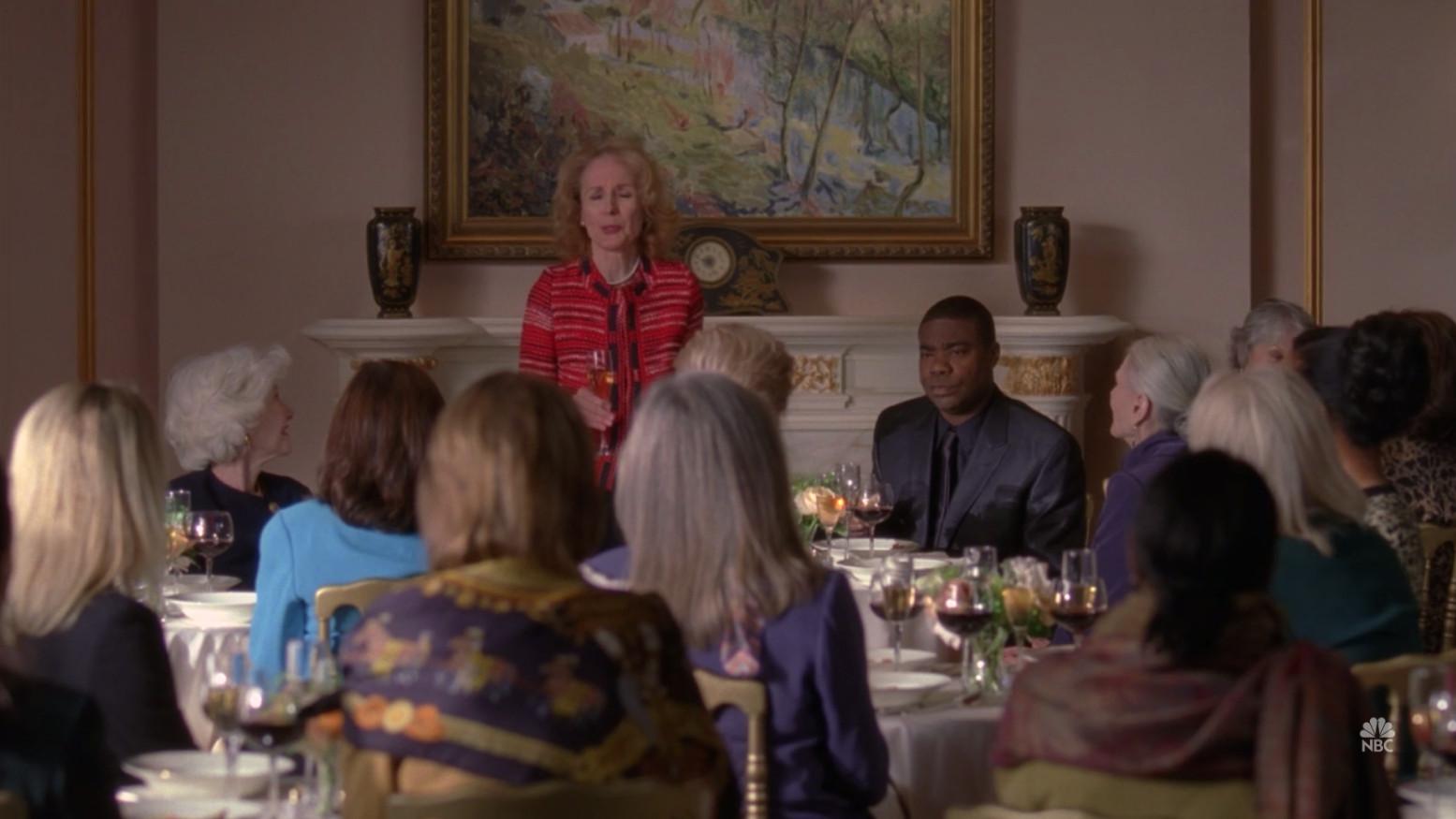
Part 8: Tracy Inspires a Movement
Before 30 Rock’s “Dealbreakers Talk Show #0001” aired in 2009, there were 10 people who picked up EGOT honors. Since then, five more artists have completed their EGOT quests: Scott Rudin (2012) and Robert Lopez (2014), and, last year, John Legend (who also became the first African American man to EGOT), Andrew Lloyd Webber, and Tim Rice joined this exclusive club.
Scardino: Suddenly the cheesiest thing in the show then became a thing. That was kind of extraordinary, and it spoke to the power of and certainly the popularity of our show, and how a show that satirizes pop culture could then influence pop culture. Now the EGOT has become suddenly a goal that people want to pursue. If wanting to be an EGOT inspires people to try and do their best work, then I suppose it’s a good thing.
Nussbaum: The thing I love about the show is that it’s not corny and heartwarming, but it’s also not cynical and nihilistic. It’s actually somewhere in the middle. It has a real kind of politic attitude to how people go about their lives. I just think it’s smart about the idea that it is about people being crazy in the entertainment industry.

Cannon: I would like Philip Michael Thomas to EGOT. Kind of wish that that dream for him would come true.
Scardino: I’ve got a Producers Guild Award. I’ve got two Emmy awards, but ultimately, the truth is 30 Rock was a great, great, creative expression by so many people and made so many people laugh, and who cares if we won awards or not? That’s not really the point, so I think that’s what we’re finally saying with the Tracy story is like, it’s kind of baloney.
Yeardley Smith (an actress who voices Lisa on The Simpsons), discussing her past career goals: It was … like … “I’ll win all the awards. I’ll be an EGOT by the time I’m 24.”
Viola Davis (an actress who has won an Oscar and an Emmy): I don’t sing, I mean I really don’t sing. Well, maybe I’ll do a spoken word thing with Kanye West or something like that!
Helen Mirren (an actress who has won an Oscar, an Emmy, and a Tony): I want a Grammy. I’ve got to do an audio book. I certainly won’t win a Grammy singing.
Cyndi Lauper (a singer who has won an Emmy, a Grammy, and a Tony): I really want that Oscar. … I need that EGOT.
Kate Winslet (an actress who has won an Emmy, an Oscar, and a Grammy), when asked if Broadway is in her future: “Well I suppose it probably is now. And that’s more because of my 12-year-old son Joe, who ... is just obsessed with records. So since he has learnt about this “EGOT” thing, he’s like, “Mum you’ve gotta do it.”
Lin-Manuel Miranda (actor): Got a Grammy, got a Tony, got an Emmy, goddammit homie, somebody show me the way to the Oscars.
Morgan: Now, Tracy Jordan has and will forever have an EGOT. People, to this day, still affiliate me with that episode. Still talking about the EGOT. … Fans remember the EGOT episode. That sticks out. I pray to EGOT one day. I would have to go to Broadway. I don’t know what I’m gonna do on Broadway, but I hope it’s something to win me a Tony.
These interviews have been condensed and edited for clarity.
